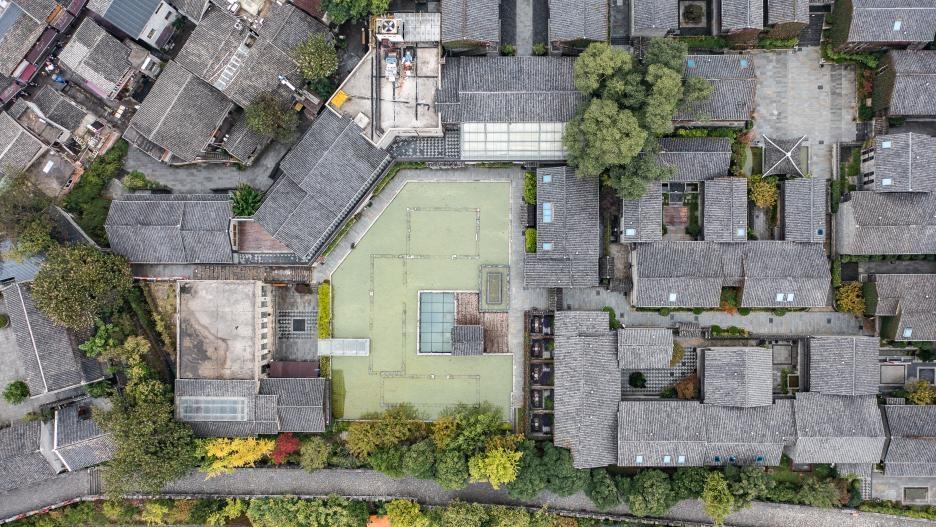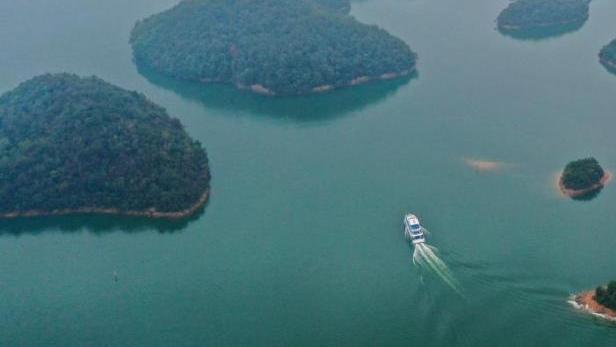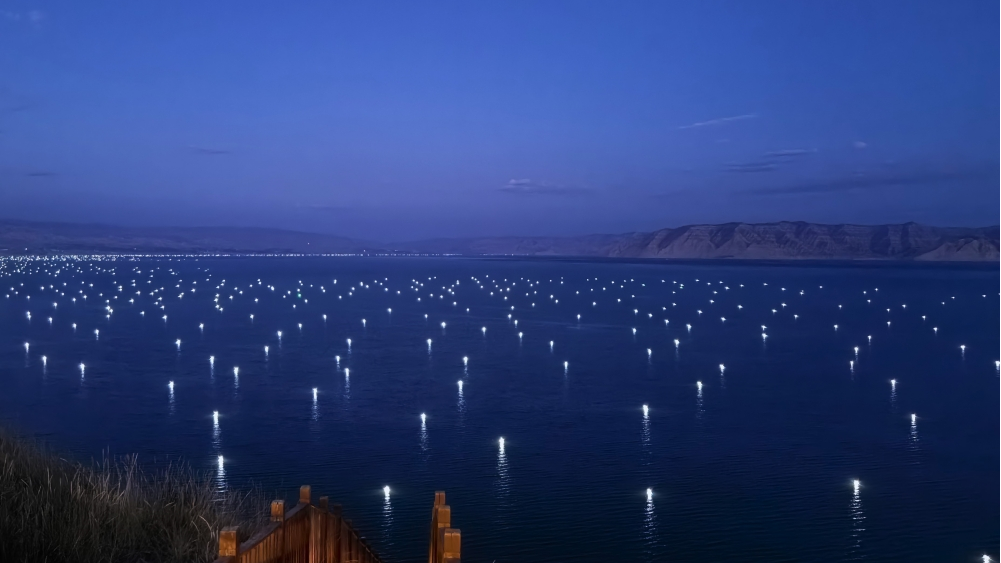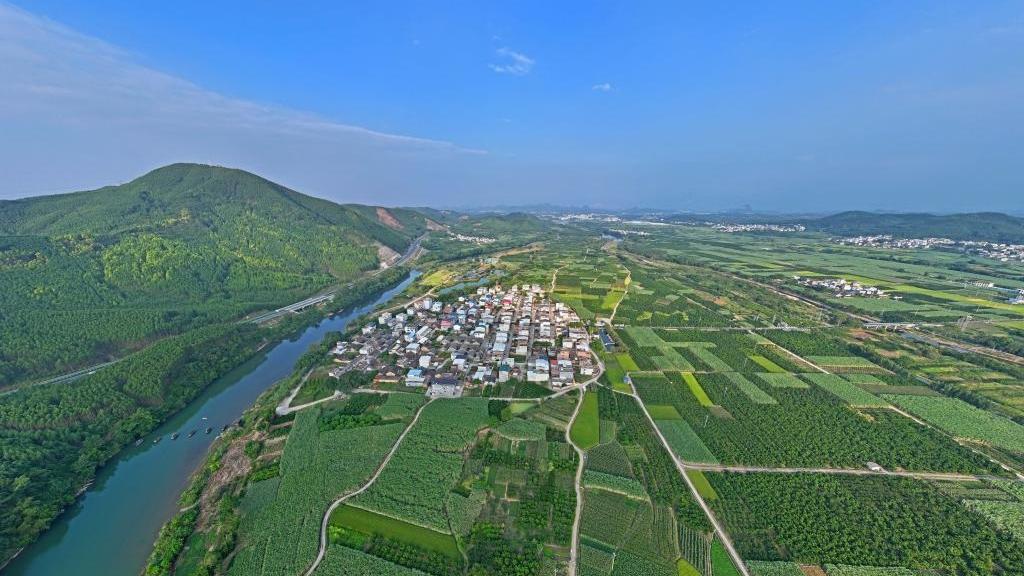Fishermen in Sansha embrace happier life under sustainable and eco-friendly fishery policy

Chinese fishermen move their boats from shore to the sea before heading out to fishing on September 24, 2024, at a dock on Yongxing Island, Sansha city, South China's Hainan Province. (Photo: Wang Qi/GT)
After a three-and-a-half-month fishing moratorium and a super typhoon in early September, fishermen in the Xisha district of China's southernmost island city of Sansha, have resumed production. Global Times reporter visited Yongxing, Jinqing, and Zhaoshu islands of the Xisha Islands and talked with local fishermen and community staff.
From the stories shared by local fishermen, one can easily see how China's new fishery-related policies have greatly benefited their lives and significantly contributed to the ecological protection and sustainable development of fishery resources in the South China Sea.
Great changes
After landing on Yongxing Island, home to the Sansha city government, the reporter was marveled at a breathtaking view of emerald waters glistening under the sun, lush tropical flora, and modern amenities. Although small, Yongxing does not lack any modern conveniences, providing visitors and residents full Wi-Fi coverage, stores, clinics, schools, basketball courts, and even hot pot restaurants, cafes, and movie theaters.
Li Wangsan, 66, is a veteran fisherman who has been fishing with his father since he was 20, and has traveled all over the South China Sea. Now his three sons are fishermen too.
Like most fishermen in Xisha, Li's ancestors came from the town of Tanmen, Hainan Island, and have been fishing and living in Xisha for several generations.
Li told reporters that the city government has built and gifted houses to the local fishermen. Just about two decades ago, fishermen were crammed into shabby wooden felt houses, with only loose underwear or a towel to cover their tanned bodies.
On Zhaoshu Island, the local government also helps fishermen improve their living conditions. Local community staff Cai Lihong told the Global Times that they provide fishermen with 15 tons of fresh water and 300-kilowatt hours of electricity per month for free. Given the hot weather, each house of fishermen is equipped with two air conditioners.
Moreover, the reporter was told that the fishermen who stay long-term on the islands of Xisha can receive a subsidy of 35-45 yuan ($4-5.7) per person per day.
Wang Long, a local official on Jinqing Island, the administration center of Yongle Islands, told the reporter that new fishermen who came to Yongle can get a daily subsidy of 230 yuan per person.
To ensure the safety of fishermen, all fishing boats are now equipped with the BeiDou Navigation System, with local weather stations offering timely weather forecasts to fishermen.
More sustainable
At the dock on Yongxing Island, fishermen were getting ready to set out to sea, some repainting their boats and some checking and cleaning their engines. The reporter noticed that their fishing equipment consisted of just a few fishing rods, diving suits, small nets, and pails.
The fishermen said that most of them work on the reef, within a distance of 10 nautical miles and Chinese fishermen mainly practice pole fishing and snorkeling. The reporter noticed that the size of Chinese fishing boats is usually small, meaning they cause minimal damage to the coral on the seafloor.
Fishermen said that the use of explosives, poisons, electricity, and any other means in fishing that deplete fishery resources is strictly prohibited by law, and local staff regularly educate fishermen about these regulations.
"We don't hunt turtles and giant clams and we know it's illegal… now they are often seen in our nearby waters, demonstrating the effectiveness of our protection effort," a fisherman surnamed Xie on Zhaoshu Island said.
"We take pictures and tell fishermen what they can catch, and what they are not allowed to do... and we also specify size requirements, for example, some fish can only be caught if they are more than four or five fingers wide," said Cai from the Zhaoshu Island.
Since 1995, China has implemented a summer fishing moratorium policy. So far, it has covered four sea areas: the Bohai Sea, the Yellow Sea, the East China Sea, and the South China Sea. The South China Sea, north of 12 degrees north latitude, ended its three-and-a-half-month fishing moratorium on August 16 this year.
In addition, an independent fishing moratorium has been implemented on the high seas where no international regional fishery organization has yet managed, making an important contribution to the sustainable development of international fishery resources.
The reporter learned that at the beginning of the fishing moratorium, many fishermen complained about the policy. But now, the fishermen have shown full understanding and support.
Fu Mingyou, a fisherman on Zhaoshu Island, said that during China's fishing ban period, fishermen from other countries used to trespass into the waters under China's jurisdiction using illegal methods such as explosives and electric shocks to fish. "Everyone else goes fishing except for us, and that really felt quite unfair."
Fishermen from other islands told the reporter that they all shared similar feelings in the past decade. However, thanks to the strict law enforcement by the China Coast Guard, such incidents have significantly decreased in the past two years.
"Fish need to grow too, and the fishing moratorium prevents unregulated fishing, which really matters for our next generations," Fu said.
As he grew older, Fu found himself fishing less frequently. In 2017, he became a reef ranger on Zhaoshu Island and a member of the greening team.
In terms of ecological protection, the Xisha Islands have made great efforts in the greening of islands, and the cleaning of reefs and floating wastes. Fishermen told the reporter that 20 years ago, the Xisha Islands were far less clean and tidy. Nowadays, fishermen are more and more involved in the protection of the ecological environment.
"We go to check our reef's changes weekly, to protect sea turtles and migratory birds spawning, and to help treat injured animals. In addition, we also engage in daily cleaning of sea floating garbage, picking up the trash and sorting it at the cleaning station," Fu said.
While some islands in Sansha have provided economic incentives for islanders to participate in the cleanup efforts, Fu said that protecting the environment and ecology is the responsibility of the people of Sansha. "It's not about the money."
'Guarding South Gate'
As China's southernmost island city, Sansha is adjacent to several Southeast Asia countries.
Recalling his experiences of dealing with fishermen from other countries three decades ago, Li Wangsan said that before the South China Sea dispute heated up, the fishermen were on good terms and there were few frictions.
"We fished together and helped each other… We didn't speak the same language, but we communicated through gestures to exchange any goods needed," Li recalled.
"The fishermen all live a hard life, earning a small income to support their families… We often visited their boats and they visited ours and we offered each other our best cigarettes, treating each other like relatives and friends," Li said.
After the South China Sea disputes heated up in the last decade, Li said fishermen from different countries have not been on each other's ships anymore.
"But the ocean is so large and the resources are so rich, if we can jointly develop it, it will be very beneficial, as long as it is not destructive," Li added.
Despite the maritime delimitation disputes and geopolitical games in the South China Sea, China has been actively engaged in fishery cooperation with Vietnam, the Philippines, Indonesia, and other neighboring countries, focusing on breeding and releasing, fishing technology training, and other means to seek the sustainable development in the fishery sector.
Fu Mingyou explained that the beautiful Xisha is a "sea inherited from ancestors."
"My ancestors have been catching fish here since the Qing Dynasty (1644-1911). Protecting the islands and reefs is the common responsibility and mission of every generation of our fishermen."
"We used to fish to feed our families, but now we gradually realize that we come to fish, but also to protect the islands, and safeguard the south gate of our motherland, and this makes me feel very proud," Fu said.
Photos
Related Stories
- Hainan duty-free sales exceed 110 mln USD during National Day holiday
- China's Hainan sees robust foreign trade in first three quarters
- Chinese military conducts maritime patrol in South China Sea
- Chinese premier urges relevant countries to respect China's peace efforts in South China Sea
- "Guarding Rainforest Homeland" exhibition held in Haikou
Copyright © 2024 People's Daily Online. All Rights Reserved.









